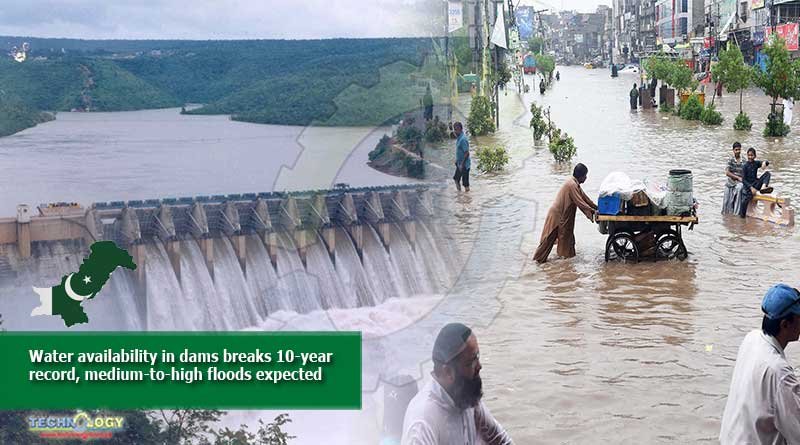Water availability in three main water reservoirs Tarbela, Mangla and Chashma breaks 10-year record; some rivers in medium-to-high flood

The country’s major reservoirs reached their full capacity on Friday as some of the rivers witnessed medium-to-high floods following the countrywide rainfalls.
The Federal Flood Commission (FFC) and the Water and Power Development Authority (Wapda) said both Tarbela and Mangla dams attained their maximum conservation levels of 1,550 feet and 1,242 feet, respectively.
The FFC attributed the filling of dams to effective management of inflows and outflows of the reservoirs, especially by Wapda and the Indus River System Authority (Irsa). It advised the dams operating authorities, including the Flood Monitoring Cell of Mangla, Irsa and the Pakistan Meteorological Department (PMD), to take utmost care and exercise extra vigilance of the reservoirs’ operation.
The combined live storage of major reservoirs — Tarbela, Mangla and Chashma — was reported at 13.425 million acre feet (MAF) on Friday, which accounted for 98.61per cent of the 13.614 MAF maximum storage capacity, a record water availability during the last 10 years. Wapda said the water available in Tarbela and Mangla dams was 2.173 MAF more when compared to last 10 years’ average. The average water availability in the two dams during the last 10 years on the day was recorded at 11.163 MAF.
This better hydrological situation will aptly fulfil the requirement of water for the country’s agriculture in the days to come. More water availability in the reservoirs will also result in more hydel generation in the coming days.
Wapda’s hydropower stations have been providing more than 8,500MW of electricity for the past two days and the generation could touch 9,000MW over the next few days.
The FFD said sporadic and heavy rains over the upper catchments of River Chenab resulted in high flood discharges in Marala-Khanki Reach, with medium flood at Qadirabad (downstream Khanki). River Indus at Tarbela and Chashma in Guddu-Sukkur Reach, River Jhelum in Mangla-Rasul Reach and River Swat at Chakdara Bridge were flowing in low flood on Friday evening. Other main rivers — Ravi and Sutlej — were flowing normal.
Due to sporadic rains in the upstream catchment areas of River Jhelum (Kotli, Kallar, Palandri, Mangla, Rawalakot, etc) and River Jhelum at Mangla experienced very high flood discharge of 265,000 cusecs on Thursday evening.
River Chenab at Marala experienced high flood level of 304,000 cusecs on Thursday midnight.
The heavy rainfall spell occurred over the past few days in various parts of Sindh, especially Karachi, had caused severe urban flooding in the provincial capital.
The PMD said the monsoon depression, which had been over north Orissa (India), was over north Chattisgarh and adjoining eastern Madhya Pradesh on Friday with weak seasonal low persisting over western Balochistan, bringing in weak moist currents from the Arabian Sea into upper parts of Pakistan up to 5,000 feet.
The Flood Forecasting Division of PMD at Lahore predicted scattered thunderstorm and rain of moderate intensity for the next 24 hours over Rawalpindi, Lahore, Gujranwala, Sargodha and D.G. Khan divisions of Punjab, Peshawar, Kohat and D.I. Khan divisions of Khyber Pakhtunkhwa, including upper catchments of all major rivers, besides isolated thunderstorm and rain over Multan, Faisalabad, Sahiwal and Bahawalpur divisions of Punjab, southern and southeastern Sindh and northeastern Balochistan.
The FFD said River Jhelum at Mangla (upstream) was likely to attain medium-to-high flood category, River Chenab in Khanki-Qadirabad Reach high flood category and River Chenab at Trimmu was likely to experience medium-to-high flood category on August 30.
Moreover, flows are also likely to increase up to medium flood category in nullahs of Chenab and Ravi and hill torrents of D.G. Khan division.
The article is originally published at Dawn.
